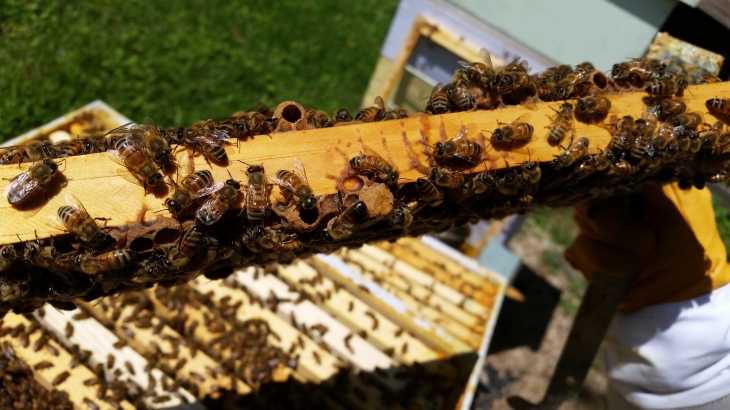I began beekeeping in the spring of 2012. I’ve learned a lot since then, particularly how much I don’t know. Honey bees are amazing insects and greatly impact our world. Responsible for pollinating crops that result in close to a third of the foods we eat, maintaining their health and vitality is important to us all.

For me, getting into beekeeping wasn’t a matter of intense interest in honey bees. Quite honestly, I was always the first to swat at them and I feared their sting. I’ve come a long way, garnering a healthy respect for their important work as I’ve watched them up close in their hives and in my garden, fostering a whole new appreciation for the critical role they play in our ecosystem. But truth be told, it was chickens I really wanted.

We moved to a more rural part of Maryland in 2004. At settlement, I signed paperwork acknowledging the rural nature of our county and that livestock could be kept at our address, regardless of its smaller size. That day, that very instant, I began dreaming of chickens, but for various reasons (work, children, life, even trepidation and doubt), I put off this dream. Instead, I planted a garden and established an actual landscape from a couple of builder planted bushes and lots of grass. Then one day in the winter of 2012, with a nudge from a friend who kept honey bees (and chickens, oh joy), I registered for a course on beekeeping organized by my local bee club, got hooked and “settled for bees.”

With each passing season of each passing year, I haven’t just learned about the fascinating world of honey bees, but also the complex world in which they maneuver. I also learned about myself. I’m learning to rebel against the voice in my head that doubts my abilities and questions my dreams, even when things go wrong, like losing a colony I nurtured through a brutal winter that died of starvation in March when they seemed to have soldiered past the worst of the winter. I’m embracing the failures as learning opportunities and sharing them so others might benefit from me.
As I journey through it all, my respect for how we fit into our amazing planet has grown exponentially, recognizing that it’s all so much bigger than us. Our choices matter. Our actions are impactful. While we can do much harm to the environment, likewise we can do much good, even by small, localized measures. I find it important to embrace that notion and make conscious choices that have a positive impact on the world we will one day leave behind for future generations. While we can’t do it all, we can educate ourselves and then determine what works for us, implementing one small change at a time.

Through this blog, I share my journey from gardening to beekeeping to chicken keeping, for you see, the chickens are now an important part of the equation. My family enjoys a front row seat into the marvels of nature. We watch honey bees work alongside native bees to pollinate our plants and vegetables, making delicious, nutritious honey from our diverse landscape offerings and providing us with an abundance of fruits and vegetables. Our eight hens keep us laughing with their silly antics and contribute to our gardening efforts with their own integrated pest management.

And eggs? Well, yes, they are pretty darn fun to collect. Cracking the hard shell of a fresh egg laid by a happy, spoiled hen and seeing the bright orange-yellow yolk and solid egg whites isn’t just rewarding, but delicious. I’ve always enjoyed growing fruits and vegetables absent chemicals but now adding nutritious eggs to the table takes us even further.

In my postings, I contribute my observations, learnings and mistakes along the way as I love to talk about my honey bees, my garden and of course, my brood of backyard chickens. In doing so I hope to educate, ever so humbly, and moreover, inspire others to try something new, embracing all of the messiness that comes with new ventures. “Settling for bees” really opened new doors for me, taking me on paths far greater than I initially envisioned. And isn’t that what our journeys are all about? Let’s journey on friends!
Connie


I really enjoyed reading this, especially since I understand those highs and lows of beekeeping. I’m sure you’ll have some great chicken stories.
LikeLiked by 1 person
You are an inspiration, Connie. Keep spreading the good word! I look forward to following along in your journey.
LikeLiked by 1 person
Love this blog. Looking forward to reading more. Cindy
LikeLiked by 1 person
Just now reading this and so excited for you!!!! Made me think of this Leopold quote-now your kids will know exactly where their breakfast comes from…
“There are two spiritual dangers in not owning a farm. One is the danger of supposing that breakfast comes from the grocery, and the other that heat comes from the furnace.”
Can’t wait to meet the chicks! We will be knocking on your door!!!
Can’t wait to meet the chicks–we will be knocking on your door!
LikeLike
Thanks Lea! If you want to get an email letting you know when I’ve added to the blog, then scroll to bottom of this and click on “follow”. Won’t be long now! 🙂
LikeLike